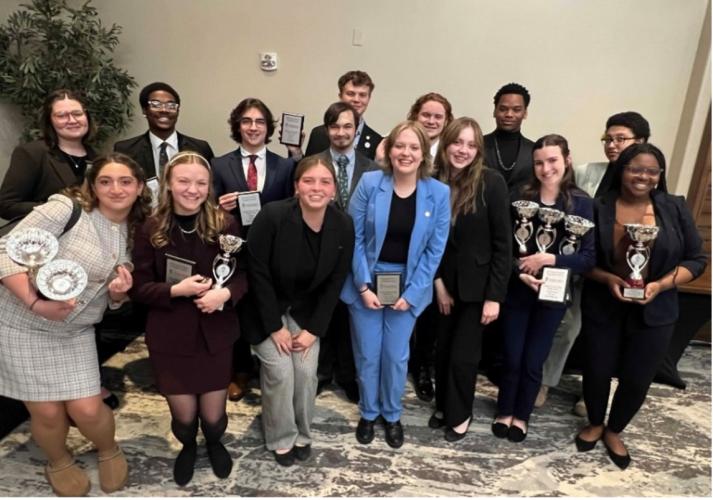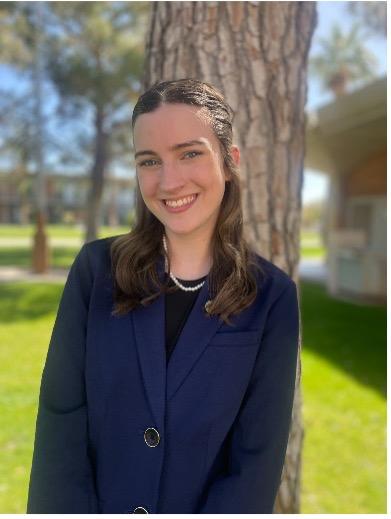

Ohio University’s Speech and Debate Team is preparing for its next national competition after being named National Champion in Individual Events (Speech events) at Pi Kappa Delta Nationals in Phoenix, AZ on March 11. The team also placed 13 th in Debate Sweepstakes and 2 nd Overall in Combined Sweepstakes (Speech and Debate).
“It’s amazing,” Jennifer Talbert, the John A. Cassese Director of Forensics, said. “It’s been a long time since Ohio University’s Speech and Debate Team was a national champion. This is another sign of resurgence for us.”
The Speech and Debate team competes each year from September through April, providing the opportunity for students to meet outstanding undergraduates from 300 or more colleges or universities in intellectual competition. Approximately 20 tournaments at other schools and several held on the Athens campus enable students to develop skills in debate, extemporaneous speaking, oratory, rhetorical criticism, and oral interpretation. The group is made up of students from many different majors. About a third of the team members are communication majors.

Emily Osborne, a sophomore from Cleveland who is a child and family studies major in the College of Health Sciences and Professions, won First Place National Champion in the Informative Speaking category. Her winning speech was about the negative impact of using diagnostic medical terms incorrectly in casual conversation.
“People misuse many diagnostic terms. Examples include the words ‘gaslighting’ and ‘traumatized’ or ‘traumatic.’ They use them in casual ways that are not ways the word was intended,” said Osborne. “The main takeaway in my speech is that therapy speak blurs a line between empathy and manipulation. In some cases, people manipulate someone by using a big fancy diagnostic word to describe their situation. And because of that, it desensitizes people to the word. So, when people are gaslit or traumatized, they don’t realize it because the word has been used to describe smaller events or emotions.”
Osborne participated with her high school speech and debate team so continuing with speech and debate at Ohio University just made sense to her. She has enjoyed the support and growth she has received through working with Talbert and the different students she has met through the program.
“It’s been awesome. It is so different from anything I’ve ever done. It is so diverse,” said Osborne. “There are so many opportunities. I really just love to try different events and see what I can talk about and share my passions. I love the team. Everyone on it is awesome. We have a lot of fun.”
“I’m incredibly proud of Emily. She’s only a sophomore,” said Talbert. “I think that she really has been able to find her voice, not only through informative speech, but through her other events. It’s always great to see someone who invests and puts in the time and energy to be able to reap those rewards.”
Talbert has been coaching the Ohio University team for the last six years but has been coaching speech and debate for a total of 25 years. There are about 25 students on the team, and they compete against 80 to 100 other students in each event.
“Speech and debate teaches such a unique skillset. It teaches students how to speak in public, which I think is so vital. I want students to be good civic citizens and be able to speak up for themselves and voice their opinions. But it also teaches research skills, writing, critical thinking, how to get along with other people, how to get along with a group, and how to dress professionally,” Talbert added. “It also teaches them to take criticism. There is an opportunity to flourish and win, but you don’t always win. It teaches how to lose in a safe environment.”
Osborne says she already sees the positive impact of speech and debate in her day-to-day life and how it’s going to help her in her future career. She plans to become a child life specialist. Child life specialists are pediatric health care professionals who work with children and families in hospitals and other settings to help them cope with the challenges of hospitalization, illness, and disability.
“Anything I do with presentations and interviews, I’ve seen a big improvement,” said Osborne. “With Child and Family studies, speech and debate is helping me learn a lot of different perspectives. I hear others speak and make arguments about their passions and I become more well-rounded as a person. It helps me understand more about who I am going to be working with in the field and what they are going through.”
Osborne also appreciates the coaching and support she has received from Talbert. She says Talbert’s guidance and commitment helped her become the national champion.
“Jen has been a huge help,” said Osborne. “She helped me learn to pick topics and stories that are important to me and that I care about. It has been a huge difference. Jen pushed me in the right direction.”
“Emily and I did research together and went through a bunch of edits of her speech,” said Talbert. “My coaching role is the equivalent of private lessons for an instrument. She came in and delivered the speech. I listened and gave her feedback and then she did it again.”
Osborne and her teammates will seek the national champion title again during their next tournament which begins on April 18.

